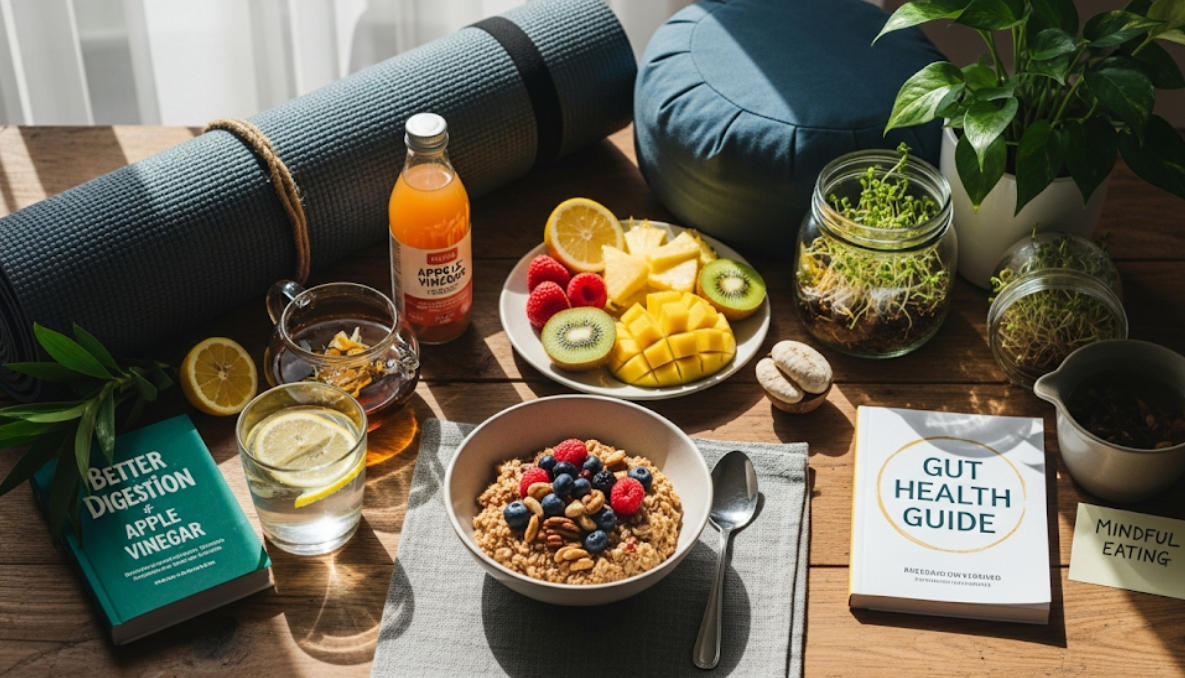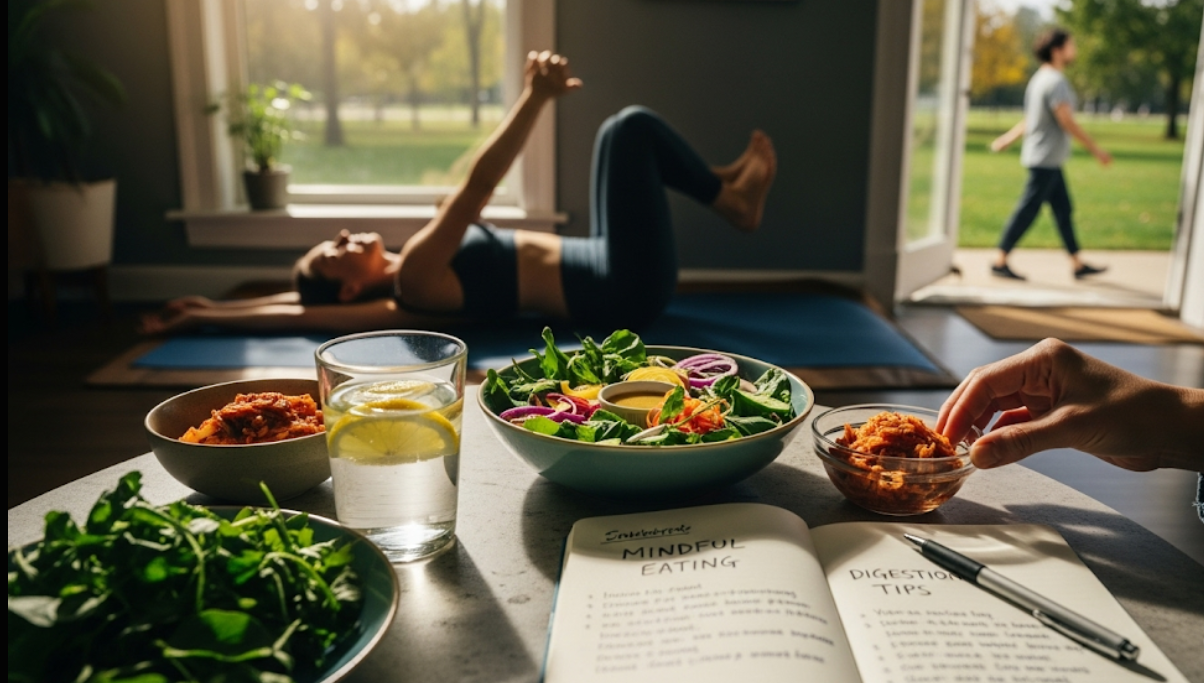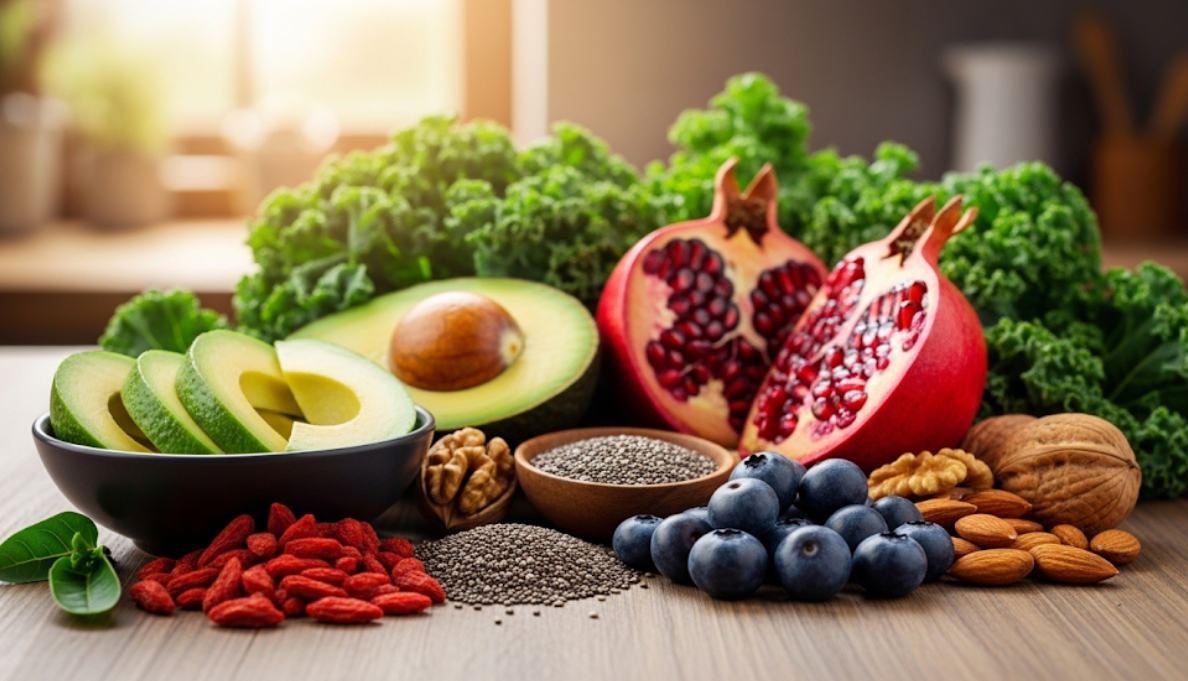Good digestion is one of those things you don’t really think about until it starts giving you trouble. A heavy stomach, bloating, gas, or feeling sluggish after eating—these are all signs your digestive system might need some extra care. The good news? You don’t need fancy supplements or expensive treatments to improve digestion. A few simple daily habits can make a world of difference.
Let’s go step by step and explore five easy yet powerful habits that can help you enjoy smoother digestion, more energy, and better overall health.
Chew your food slowly and mindfully
Most of us are guilty of rushing through meals—sometimes eating while scrolling on our phones, working, or even standing. The problem is, digestion actually begins in the mouth. Your saliva contains enzymes that start breaking down food even before it reaches your stomach.
When you chew properly and eat slowly, you:
Break food into smaller pieces, making it easier for the stomach to handle.
Give your body time to signal fullness (so you don’t overeat).
Reduce bloating and discomfort caused by swallowing too much air.
Try this: next time you eat, put your fork down between bites and focus on the flavors. At first, it feels odd, but you’ll notice your body feels lighter and more satisfied. Eating slowly isn’t just a “grandma’s advice”—it’s science-backed. 🥢
Stay hydrated, but time your water intake
Everyone knows water is important, but how and when you drink it also matters. Drinking enough water throughout the day helps soften stool, prevents constipation, and supports the natural flow of digestion. However, gulping large amounts of water during meals may dilute stomach acids and slow digestion.
A better habit is to:
Drink water 30 minutes before meals to prepare your digestive system.
Sip small amounts during meals if needed.
Avoid overloading with cold drinks right after eating (this can make digestion sluggish).
One easy tip: keep a reusable water bottle near you. People who keep water close by usually drink more without even thinking about it. 🚰
Eat more fiber, but balance it right
Fiber is like the cleaning crew for your digestive system. It helps food move smoothly, prevents constipation, and feeds the “good bacteria” in your gut. But here’s the thing—too much fiber all at once can cause bloating and discomfort, especially if your body isn’t used to it.
There are two types of fiber:
| Type of Fiber | Sources | Role in Digestion |
|---|---|---|
| Soluble Fiber | Oats, apples, carrots, beans | Forms a gel-like substance, slows digestion, stabilizes blood sugar |
| Insoluble Fiber | Whole grains, nuts, leafy greens | Adds bulk to stool, prevents constipation |
The key is balance. Try adding both types of fiber slowly. Start with fruits like apples or pears, add a handful of nuts, or switch to whole-grain bread. With time, your gut adjusts, and your digestion improves naturally. 🌱

Manage stress, your stomach feels it too
Here’s something people often overlook: your mind and gut are closely connected. Ever felt “butterflies in your stomach” when nervous? That’s the gut-brain connection at work. Stress can actually slow digestion, cause bloating, or even trigger conditions like irritable bowel syndrome (IBS).
Some calming habits that support digestion:
Breathing exercises (deep inhales and slow exhales before meals)
A short daily walk or light yoga
Keeping mealtimes peaceful instead of eating in a rush or during an argument
Even taking 5 minutes to pause before eating can improve how well your body digests food. Think of it as preparing not just your plate, but also your mind. 🧘
Read more: Top 12 Cardio Exercises to Burn Fat Fast
Keep a regular meal routine
Our bodies love routine. Eating meals at random times—sometimes skipping breakfast, sometimes eating a heavy dinner late at night—confuses the digestive system. Your stomach and intestines work best when they have a rhythm.
Try to:
Eat at roughly the same times each day.
Keep dinner lighter and avoid eating right before bed.
Listen to your body’s natural hunger cues rather than eating only when “it’s convenient.”
Your digestive system is like a clock—it likes predictability. Over time, sticking to regular meals can reduce indigestion, bloating, and even acid reflux.
Small bonus tips that really help
Aside from the main five habits, here are a few small yet surprisingly effective tricks:
Include fermented foods like yogurt, kefir, or sauerkraut—they add good bacteria for gut health.
Get moving after meals—a short 10-minute walk can speed up digestion.
Avoid overeating; stop when you’re about 80% full.
These tiny adjustments can support your main habits and make digestion much smoother without major effort.
Quick Summary Table
| Habit | Why it helps digestion | Simple Action Step |
|---|---|---|
| Chew slowly | Starts digestion in the mouth | Put fork down between bites |
| Stay hydrated | Softens stool, prevents constipation | Drink water 30 min before meals |
| Eat more fiber | Improves bowel movement & gut bacteria | Add fruits + whole grains daily |
| Manage stress | Gut-brain link affects digestion | Practice breathing/yoga before meals |
| Keep routine | Supports natural digestive rhythm | Eat at consistent times each day |
FAQs about Better Digestion
Q1. Can drinking warm water really help digestion?
Yes, many people find warm water soothing because it relaxes the digestive muscles and helps food move along more smoothly.
Q2. Should I completely avoid spicy food for better digestion?
Not necessarily. Some spices actually aid digestion (like ginger or cumin). The problem is overeating very hot or oily foods, which can irritate the stomach lining.
Q3. How long does it take to improve digestion once I change habits?
Some changes, like chewing slowly or drinking water on time, show results almost instantly. Others, like eating more fiber, may take a week or two as your body adjusts.
Q4. Are probiotics necessary for good digestion?
They can help, especially if you often face bloating or irregular bowel movements. But they’re not always required if you already eat a balanced diet with fermented foods.
Q5. Is eating late at night really bad for digestion?
Yes, because your body is winding down, and lying down right after eating can cause acid reflux or heaviness. Ideally, finish dinner at least 2–3 hours before sleeping.
Final Thoughts
Better digestion doesn’t need a complicated plan. It’s about returning to the basics—eating slowly, drinking water wisely, balancing fiber, managing stress, and respecting your body’s natural routine. When you start practicing these habits consistently, you’ll notice less bloating, more energy, and even a brighter mood.
It’s amazing how small daily choices can heal your gut from the inside out. 🌿






